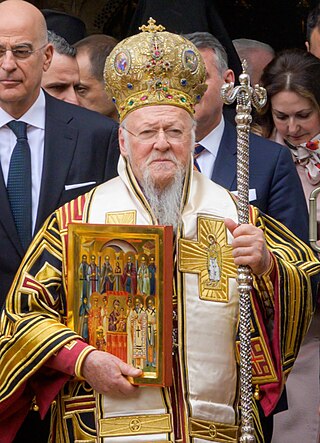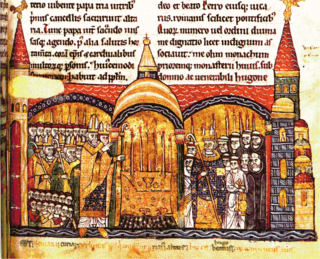
The Eastern Orthodox Church, officially the Orthodox Catholic Church, and also called the Greek Orthodox Church or simply the Orthodox Church, is the second-largest Christian church, with approximately 230 million baptised members. It operates as a communion of autocephalous churches, each governed by its bishops via local synods. The church has no central doctrinal or governmental authority analogous to the head of the Catholic Church. Nevertheless, the Ecumenical Patriarch of Constantinople is recognised by them as primus inter pares, a title formerly given to the patriarch of Rome. As one of the oldest surviving religious institutions in the world, the Eastern Orthodox Church has played an especially prominent role in the history and culture of Eastern and Southeastern Europe.
The Eastern Orthodox Church, officially the Orthodox Catholic Church and commonly known simply as the Orthodox Church is a communion composed of up to seventeen separate autocephalous (self-governing) hierarchical churches that profess Eastern Orthodoxy and recognise each other as canonical (regular) Eastern Orthodox Christian churches.

The ecumenical patriarch of Constantinople is the archbishop of Constantinople and primus inter pares among the heads of the several autocephalous churches that compose the Eastern Orthodox Church. The ecumenical patriarch is regarded as the representative and spiritual leader of the Eastern Orthodox Christians worldwide. The term ecumenical in the title is a historical reference to the Ecumene, a Greek designation for the civilised world, i.e. the Roman Empire, and it stems from Canon 28 of the Council of Chalcedon.

The Ecumenical Patriarchate of Constantinople is one of the fifteen to seventeen autocephalous churches that together compose the Eastern Orthodox Church. It is headed by the Ecumenical Patriarch of Constantinople.

The Ukrainian Autocephalous Orthodox Church was one of the three major Eastern Orthodox churches in Ukraine. The Ukrainian Autocephalous Orthodox Church began in 1917 during the dissolution of the Russian Empire as part of the Ukrainian independence movement and in order to restore the Ukrainian Orthodox Church that existed in the Polish-Lithuanian Commonwealth in 1620–1685 and was annexed by the Moscow Patriarchate without approval of the Ecumenical Patriarchate of Constantinople.

Boris I, venerated as Saint Boris I (Mihail) the Baptizer, was the ruler (knyaz) of the First Bulgarian Empire in 852–889. Despite a number of military setbacks, the reign of Boris I was marked with significant events that shaped Bulgarian and European history. With the Christianization of Bulgaria in 864, paganism was abolished. A skillful diplomat, Boris I successfully exploited the conflict between the Patriarchate of Constantinople and the Papacy to secure an autocephalous Bulgarian Church, thus dealing with the nobility's concerns about Byzantine interference in Bulgaria's internal affairs.

The Serbian Orthodox Church is one of the autocephalous Eastern Orthodox Christian churches.

The Bulgarian Orthodox Church, legally the Patriarchate of Bulgaria, is an autocephalous Eastern Orthodox jurisdiction based in Bulgaria. It is the first medieval recognised patriarchate outside the Pentarchy and the oldest Slavic Orthodox church, with some 6 million members in Bulgaria and between 1.5 and 2 million members in a number of other European countries, Asia, the Americas, Australia, and New Zealand. It was recognized as autocephalous in 1945 by the Ecumenical Patriarchate of Constantinople.

The Bulgarian Exarchate was the official name of the Bulgarian Orthodox Church before its autocephaly was recognized by the Ecumenical See in 1945 and the Bulgarian Patriarchate was restored in 1953.

The Archbishopric of Ohrid, also known as the Bulgarian Archbishopric of Ohrid, originally called Archbishopric of Justiniana Prima and all Bulgaria, was an autocephalous Eastern Orthodox Church established following the Byzantine conquest of Bulgaria in 1018 by lowering the rank of the autocephalous Bulgarian Patriarchate due to its subjugation to the Byzantines. In 1767, the Archbishopric's autocephaly was abolished, and the Archbishopric was placed under the tutelage of the Patriarchate of Constantinople.

The Macedonian Orthodox Church – Archdiocese of Ohrid, or simply the Macedonian Orthodox Church (MOC) or the Archdiocese of Ohrid (AO), is an autocephalous Eastern Orthodox church in North Macedonia. The Macedonian Orthodox Church claims ecclesiastical jurisdiction over North Macedonia, and is also represented in the Macedonian diaspora. The primate of the Macedonian Orthodox Church is Stefan Veljanovski, the Metropolitan of Skopje and Archbishop of Ohrid and Macedonia.

Pentarchy was a model of Church organization formulated in the laws of Emperor Justinian I of the Roman Empire. In this model, the Christian Church is governed by the heads (patriarchs) of the five major episcopal sees of the Roman Empire: Rome, Constantinople, Alexandria, Antioch, and Jerusalem.

Religion in Bulgaria has been dominated by Christianity since its adoption as the state religion in 864. The dominant form of the religion is Eastern Orthodox Christianity within the fold of the Bulgarian Orthodox Church. During the Ottoman rule of the Balkans, Islam spread to the territories of Bulgaria, and it remains a significant minority today. The Catholic Church has roots in the country since the Middle Ages, and Protestantism arrived in the 19th century; both of them remain very small minorities. Today, a significant part of the Bulgarians are not religious, or believers who do not identify with any specific religion, and Bulgaria has been the cradle of some new religions, notably the Neo-Theosophical movement of Dunovism.
The Archbishop of Ohrid is a historic title given to the primate of the Archbishopric of Ohrid. The whole original title of the primate was Archbishop of Justiniana Prima and all Bulgaria.

By the 10th century, Christianity had spread throughout much of Europe and Asia. The Church in England was becoming well established, with its scholarly monasteries, and the Roman Church and the Eastern Orthodox Church were continuing their separation, ultimately culminating in the Great Schism.
The Siege of Constantinople was fought in June 922 at the outskirts of the capital of the Byzantine Empire, Constantinople, between the forces of the First Bulgarian Empire and the Byzantines during the Byzantine–Bulgarian war of 913–927. In the summer the Byzantine Emperor Romanos I Lekapenos sent troops under the commander Saktikios to repel another Bulgarian raid at the outskirts of the Byzantine capital. The Byzantines stormed the Bulgarian camp but were defeated when they confronted the main Bulgarian forces. During his flight from the battlefield Saktikios was mortally wounded and died the following night.
Leontius was the first Patriarch of the Bulgarian Orthodox Church. Very little is known of his life and tenure. He was mentioned as the first Patriarch of Bulgaria in the Book of Boril, written in 1211.
Demetrius was the second Patriarch of the Bulgarian Orthodox Church and the first one to have been recognized by the Ecumenical Patriarch of Constantinople as a result of the Byzantine–Bulgarian Treaty of 927, which affirmed the Bulgarian victory in the War of 913–927 against the Byzantine Empire. Demetrius headed the Bulgarian Patriarchate in the first years of the reign of emperor Peter I.

The Tаrnovo Patriarchate was the name of an independent Bulgarian Orthodox Church in the period of 1235–1393.















